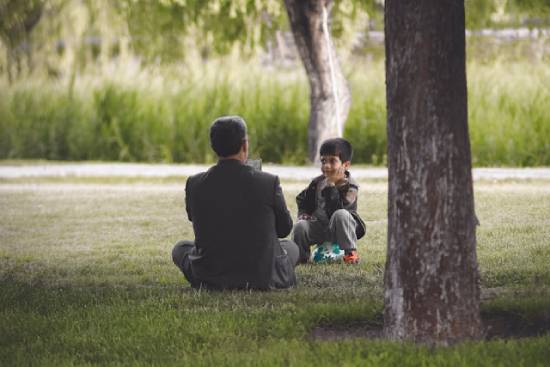How Can I Raise Respectful Children in Today’s World?
In today’s fast-paced, media-saturated world, many parents feel overwhelmed trying to raise children who are not only obedient but truly respectful—toward themselves, others, and God.
Whether it’s defiance at home, peer pressure at school, or digital distractions at every turn, instilling biblical values and character in our children feels more difficult than ever. And yet, it is more urgent than ever.
This guide is for you if you often find yourself asking, “Am I doing enough to raise my child right?”
This article explores how parents can nurture respect in their children, not just as a set of manners, but as a way of life rooted in love, boundaries, and biblical truth.
You’ll learn:
- The difference between obedience and respect (and why it matters)
- How to model respect through your own behaviour
- Practical parenting strategies that encourage empathy, humility, and responsibility
- How the Bible defines and supports the development of respectful character
- Ways to respond to disrespect in a constructive, faith-based manner
Let’s begin by distinguishing between obedience and respect.
Obedience vs. respect: Why the difference matters
Obedience can be demanded, but respect must be nurtured. It’s easy for parents to confuse the two; after all, a child who follows instructions without protest might appear to be respectful. But genuine respect goes beyond compliance; it reflects the internalisation of values like empathy, accountability, and honouring authority, including God’s.
Teaching children respect involves more than correcting behaviour. It’s about shaping character through clear expectations, structure, and a loving but calm tone that encourages learning over fear.
And the Bible makes it clear:
“Train up a child in the way he should go,
And when he is old he will not depart from it” (Proverbs 22:6, NKJV).
So how do we move beyond rules to raise children of integrity? It begins with what we show them daily.
Modelling respect through your own behaviour

Photo by Osarugue Igbinoba on Unsplash
Children don’t just learn respect by hearing about it. Instead, they learn by seeing it.
Whether we’re interacting with them, our spouses, neighbours, or even strangers, our children are constantly observing how we treat others. This is why modelling respectful behaviour is one of the most powerful teaching tools available to any parent.
Here are some practical ways to do that:
- Speak with a calm tone, especially when correcting.
- Show empathy when your child is upset: “I can see this made you sad.”
- Practise active listening and validation: “I hear what you’re saying, and it’s okay to feel that way.”
- Keep promises: This models accountability.
- Treat their concerns as real—even when they’re small to you.
As we model integrity, humility, and patience, our children begin to reflect those same values in their own relationships.
And this naturally transitions us to the next step: How to teach those values through practical parenting.
Practical strategies to encourage empathy, humility, and responsibility
Once we’ve set the example, it’s time to equip our children with tools to grow in character. Here’s where positive discipline comes in. Not punishment, but training.
Here are practical, Bible-affirming strategies to help parents raise respectful children:
Set clear expectations
Children thrive on structure, routines, and clear expectations.1
Communicate your family’s core values often: respect, honesty, compassion, and hard work. Use family devotions or mealtimes to remind them of these.
Teach emotional regulation
Help your children recognise and name their emotions. This teaches emotional regulation. Instead of saying “Stop crying!” try “It’s okay to be sad. Let’s talk about it.” This cultivates self-awareness and compassion.
Use praise and positive reinforcement
Celebrate respectful behaviour with specific praise. “Thank you for speaking kindly to your brother.” Reinforce what you want to see again. Praise reinforcement is far more effective than only pointing out what they’re doing wrong.
Give choices and autonomy
Offer controlled choices: “Would you like to do your homework now or after dinner?” This teaches autonomy and gives children a sense of responsibility, making them more likely to cooperate.
Apply natural and logical consequences
Rather than punish arbitrarily, let consequences relate to the action. For example, if your child refuses to wear a jacket, they’ll feel cold (a natural consequence). If they break a rule, they might lose a related privilege (logical consequence). These methods build accountability.
When these strategies are used consistently, they help children internalise respect, not as a duty, but as a principle that aligns with their identity in Christ.
What the Bible says about respect and character
The Bible is rich with parenting wisdom. One powerful verse instructs the following:
“And you, fathers, do not provoke your children to wrath, but bring them up in the training and admonition of the Lord” (Ephesians 6:4, NKJV).
This speaks directly to positive discipline—training with grace, patience, and godly instruction.
Key biblical values to teach and model include:
- Empathy: “Rejoice with those who rejoice, and weep with those who weep” (Romans 12:15, NKJV).
- Respect for authority: “Honor your father and your mother, that your days may be long upon the land which the Lord your God is giving you” (Exodus 20:12, NKJV).
- Self-discipline: “Whoever has no rule over his own spirit is like a city broken down, without walls” (Proverbs 25:28, NKJV).
- Responsibility: “For each one shall bear his own load” (Galatians 6:5, NKJV).
Raising respectful children, then, is not just about behaviour management. It’s about discipleship.
How to respond to disrespect constructively and biblically

Photo by peyman ahmadi on Unsplash
Despite our best efforts, disrespect will still happen.
Children test boundaries. But how we respond matters deeply. Reacting in anger teaches fear, not wisdom. Responding with calm consistency, on the other hand, builds trust and respect.
Here’s how to correct with love:
- Stay calm. Use a gentle voice to de-escalate, not ignite.
- Revisit the boundary. “Remember, we speak kindly in this house. That includes how we talk to Mummy.”
- Give space for reflection. Sometimes, a short, quiet time helps children process emotions before correcting them.
- Encourage active communication. Ask, “What were you feeling when that happened?”
- Offer a reset. “Let’s try that again respectfully.”
Remember: every misstep is a teachable moment. With time and consistency, even the most challenging behaviours can turn into moments of growth.
Respect begins at home
Raising respectful children in today’s world is not easy, but it is possible.
By setting the example, teaching with intention, and correcting with grace, we plant seeds of empathy, character, and accountability that last a lifetime.
Whether you’re guiding toddlers or mentoring teens, the goal is the same: to shape hearts, not just control actions.
If this article spoke to you, there’s even more waiting in the Family section of HFA, a safe and reliable resource hub for parents who want to raise respectful, faith-driven children in a complex world.
To get started, here are a few handpicked articles we recommend:
- How Can I Raise Godly Children in Today’s World? –Learn practical, Bible-based steps to help your children not only behave respectfully, but also walk in the fear of the Lord, guided by truth, love, and conviction.
- Tips on Becoming a Principled Youth – Understand what your children are navigating and discover key character traits you can help instill—discipline, integrity, and self-leadership—so they grow into responsible, faith-filled young adults.
- What Does It Mean to Honour and Respect Your Elders? – Explore biblical perspectives on honour and how teaching your children to respect older generations builds humility, gratitude, and wisdom in their daily lives.
Let this be more than just reading. Let it shape how you lead your family.
- Gebre, A., Hawley, N., Carskadon, M. A., Raynor, H., Jelalian, E., Owens, J., Wing, R. R., & Hart, C. N. (2024). Child routines moderate a brief behavioral intervention to enhance sleep in school-aged children. Journal of Pediatric Psychology, 49(5), 365. https://doi.org/10.1093/jpepsy/jsae015 [↵]

